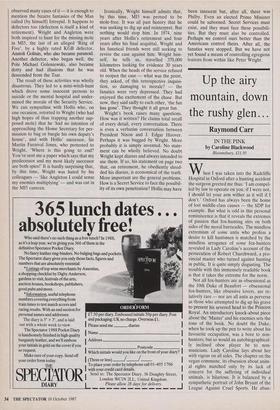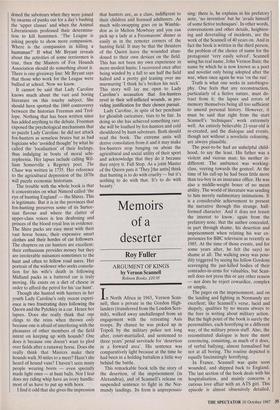Up the airy mountain, down the rushy glen...
Raymond Carr
IN THE PINK by Caroline Blackwood
Bloomsbury, £11.95
When I was taken into the Radcliffe Hospital in Oxford after a hunting accident the surgeon greeted me thus: 'I am compel- led by law to operate on you; if I were not, I should let your arm wither as it will if I don't.' Oxford has always been the home of lost middle-class causes — the SDP for example. But what is odd in this personal reminiscence.is that it reveals the extremes of passion that fox-hunting stirs on both sides of the moral barricades. The mindless extremism of some antis who profess a desire to kill huntsmen is matched by the mindless arrogance of some fox-hunters revealed in Lady Caroline's account of the persecution of Robert Churchward, a pro- vincial master who turned against hunting in public. It is quite simply disgusting. The trouble with this immensely readable book is that it takes the extreme for the norm.
Not all fox-hunters are as obsessional as the 10th Duke of Beaufort — obsessional fox-hunters, like obsessive lovers, are re- latively rare — nor are all antis as perverse as those who attempted to dig up his grave to present his severed head to the Princess Royal. An introductory knock-about piece about the 'Master' and his enemies sets the tone of the book. No doubt the Duke, when he took up the pen to write about his favourite occupation, was a bore to non- hunters; but so would an autobiographical- ly inclined oboe player be to non- musicians. Lady Caroline lays about her with vigour on all sides. The chapter on the vegan commune, its obsession about anim- al rights matched only by its lack of concern for the suffering of individual animals, is hilarious. It is balanced by a sympathetic portrait of John Bryant of the League Against Cruel Sports. He aban- doned the saboteurs when they were joined by swarms of punks out for a day's bashing the 'upper classes' and when the Animal Liberationists professed their determina- tion to kill hunstmen. 'The League is asking people to show more compassion. Where is the compassion in killing a huntsman?' If what Mr Bryant reveals about the activities of some terriermen is true, then the Masters of Fox Hounds Association should do something about it. There is one giveaway line: Mr Bryant says that those who work for the League were bullied at school. Now we know.
It cannot be said that Lady Caroline knows much about the vast and boring literature on this touchy subject. She should have spotted the 1869 controversy between the historian Freeman and Trol- lope. Nothing that has been written since has added anything to the debate. Freeman exposed the psychological mechanisms that so puzzle Lady Caroline: he did not attack fox-hunters as senseless brutes but as bad logicians who 'avoided thought' by what he called the 'localisation' of their feelings, thus indulging in bouts of moral schi- zophrenia. Her lapses include calling Wil- liam Somerville a Regency poet. The Chase was written in 1735. Her reference to the agricultural depression of the 1870s will puzzle economic historians.
The trouble with the whole book is that it concentrates on what Nimrod called 'the eye of hunting England' — the Shires. This is legitimate. But it is in the provinces that fox-hunting preserves some of its Surtee- sian flavour and where the clatter of upper-class voices is less deafening and princes of the blood royal less in evidence. The Shire packs are easy meat with their vast horse boxes, their expensive smart clothes and their hordes of car followers. The chapters on car hunters are excellent: their enthusiasm provides money but they are intolerable nuisances sometimes to the hunt and often to fellow road users. Her portrait of the widower who seeks consola- tion for his wife's death in following Midland packs in a battered car is truly moving. He exists on a diet of cheese in order to afford the petrol for his 'car hunt'.
Though she hunted with harriers in her youth Lady Caroline's only recent experi- ence is two frustrating days following the Quorn and the Pytchley in a car. Hence her lapses. Does she really think that one clings to the reins when thrown only because one is afraid of interfering with the pleasures of other members of the field intent on keeping up with hounds? One does it because one doesn't want to plod over fields after a runaway horse. Does she really think that Masters make their hounds walk 30 miles to a meet? Hasn't she heard of hound vans? I haven't seen many people wearing boots — even specially made light ones — at hunt balls. Nor I fear does my riding whip have an ivory handle: most of us have to put up with horn.
I find it odd that she gives the impression that hunters are,i as a class, indifferent to their children and licensed adulterers. As much wife-swapping goes on in Wimble- don as in Melton Mowbray and you can pick up a lady at a Freemasons' dinner as easily as in the remoter corners of the hunting field. It may be that the thrusters of the Quorn leave the wounded aban- doned to their own devices on the field. This has not been my own experience in more modest hunts: I recovered once after being winded by a fall to see half the field halted and a pretty girl leaning over me murmuring 'I think he's broken his neck'. This story will lay me open to Lady Caroline's accusation that fox-hunters revel in their self-inflicted wounds, as pro- viding justification for their chosen pursuit.
Lady Caroline, in spite of her penchant for ghoulish caricature, tries to be fair. In doing so she has achieved something rare: she will be loathed by fox-hunters and cold shouldered by hunt saboteurs. Both should read the book. The extreme antis will derive consolation from it and it may make fox-hunters stop banging on about the agricultural and social utility of their sport and acknowledge that they do it because they enjoy it. Full Stop. As a joint Master of the Quorn puts it 'They [the antisl think that hunting is to do with cruelty — but it's nothing to do with that. It's to do with beauty.'



























































 Previous page
Previous page